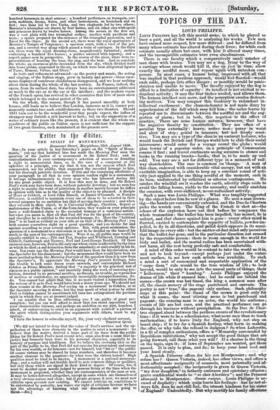Teter to 4t (than.
THE SPIRIT OF MONUMENTS.
Beaumont Street, Marylebone, 25th August 1850. Stn-In your article in last Saturdays paper on the " Spirit of Monu- ments," you say that habitual bias has made the Morning Post miss the question of the justice of a monument to Sir Robert' Peel; and in contradistinction to your contemporary's selection of success-as _founding a right to monumental fame, as in the case of a conqueror or the upholder of a principle, you say that it was not the success which Peel commanded, nor his ability, that suggested the recorded homage to hhn, but his thorough patriotic devotion. If this and the remaining attributes of your paragraph be all that in your opinion confers right to a monument, it belongs indiscriminately to every man who has laboured during life for any great public object. It is true this may be done, and Sir Robert Peers work may have been done, without patriotic devotion ; but no man has a right to assume the want of patriotism in another merely because he differs in opinion with him as to the quality of the object to be attained. A disciple of Hunt or Cobbett, or Lord John Russell, or Daniel O'Connell, or Feargus O'Connor, is entitled to maintain every one of them to be actuated in their several purposes by no ambition but that ofaerving their country ; and when they succeed in their object, be it Universal Suffrage, Chartism, Repeal or maintenance of the Union, or of the Corn-laws,' they would on' your pruiciple have a well-founded claim to the recorded homage of a• conscious nation but what you mean is, that all that Peel did was for the pod of his country and therefore he is entitled to the recorded homage, &c. Here the "habitual bias" is at least as evident on your side, as on that of the Morning Post : you both assume yourielves right on a great question, and you decide for and against according to your several opinions. But, with great submission, the question.of a monument to a statesman is not to be decided on the basis of his merit in the eyes of his contemporaries. Were it so, all public men would be equally entitled to one,—Pitt and Fox, Dundas andWhitbread, Canning and Cobbett, Castlereagh and Tierney, Peel and Lord George Bentmck. Of these eminent men, however, Peel is the only one whose claim is affectable bythe time at which he died ; a sad detraction from the unanimity or universality in his fa- vour. Ten years ago the Morning Post would hard been for his elevation, and the Spectator for his abasement; but the monument then would have been no more merited as from the Morning Post side of the question than it is now from the Spectator's. To appreciate the Morning Post's present feelings, take the trouble to look some dozen years onwards, and contemplate Richard Cobden as Prime Minister, finding that "a majority is the practical test of ripeness in a public opinion," and manfully doing the work of restoring pro- tection, deterred by no personal sacrifice, no threats, no trouble, no reproaches of motives or consistency, no apparently incorrigible misapprehensions, &c. &o. You cannot but admit that this is no more violent a supposition than the reverse of it as to Peel would have been a dozen years ago. We should not then wonder at the Morning Post crying up a monument to Cobden, or at the Spectator sneering it down; but the true merit of what is done by either Peel or Cobden cannot be ascertained till time has extinguished the partisan spirit in which they are at presentjudged.
I am sensible that in thus addressing you I am guilty of great pre- sumption; but you can well afford to show that you stand opposition ; and your characteristic fairness, and perhaps an ambition on my part, hopeless, I admit, of endeavouring to catch in an argument with yourself a portion of the spirit which distinguishes your arguments with others, must be my
apIloh. agyve the honour to subscribe myself, Sir, your very obedient servant, Tewrium Quin. [We did not intend to deny that the value of Peel's services and the ap- probation of them were elements in the motive to erect a monument we believe that the motive derived a large part of its force froth the public liking for Sir Robert Peel's most recent acts; some also from a sense that in- hustice had formerly been done to his personal character, especially to its onesty of purpose and kindliness. But we believe the crowning idea on the part of the public to be that Peel did not exercise his great talent and energy for his own wealth, or forhOnours—not for himself, but "for us" the public. Of course virtues may be shared by large numbers, and therefore it becomes another element in the question—by what were the virtues tested? High qualities must be tried to be known. A monument is a national inemoran- dues ; and a nation will not trouble itself to note common things or quaritiee,
but only those which are signal in their kind or f c
degree. Oourse, too, it must be decided upon merits _judged by persons living at the time when the monument is projected, whether they are contemporaries of the man or not. It may be better deferred altogether, except in eases which are themselves of a very obvious nature and clear • but if _people propose it now, we must now criticize upon grounds now existing. We cannot criticize on convictions to be entertained by posterity, nor waive our right of criticism because we have not the advantage of knowing what our descendants are going to think.—En.)


























 Previous page
Previous page